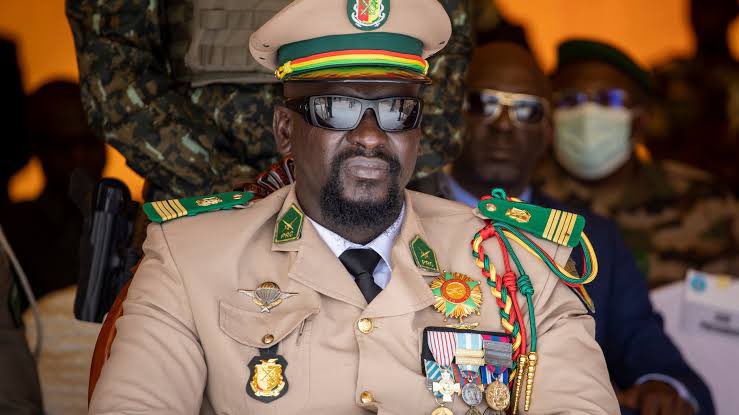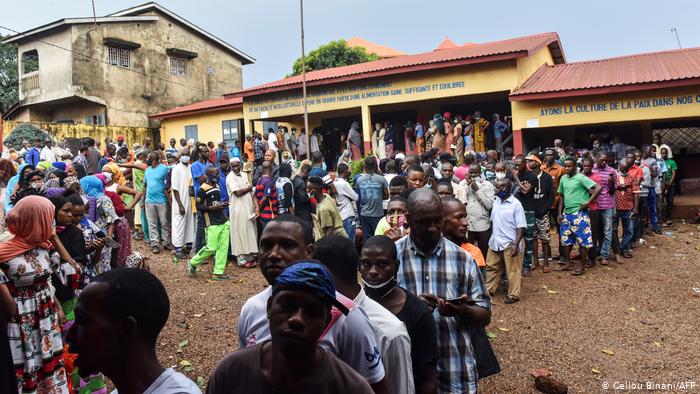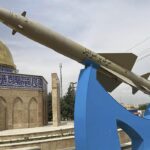- Presidential election set for 28 December 2025, the first vote since the Sept-2021 coup. A new constitution approved on 21 September 2025 (turnout reported 86%, 89% “Yes”) reshaped the rules—7-year presidential term (renewable once) and opened the door for junta figures to run.
- Incumbent’s move: On 3 Nov 2025, junta leader and interim president Gen. Mamadi Doumbouya formally entered the race, reversing earlier pledges not to run.
Key actors
- Mamadi Doumbouya / CNRD (incumbent military authorities). Controls the transition calendar, security services and the newly designed electoral machinery (critics note executive latitude over appointments). Running on order, sovereignty and mega-projects (Simandou).
- Fragmented/pressured opposition.
- Historic figures Cellou Dalein Diallo (UFDG) and Sidya Touré (UFR) have faced exile/constraints since the coup period, weakening organizational capacity.
- Other contenders: ex–PM Lansana Kouyaté (PEDN), ex-minister Ousmane Kaba (PADES), plus dozens of party and independent filings—many with limited national reach.
- Civil society & FNDC networks. Capable of mobilizing urban protests around fairness/rights; capacity reduced by crackdowns since 2021 but remains a latent variable. (Context from broader transition reporting.)
- ECOWAS / AU / partners. Seek a credible handover; leverage is lower after a wave of Sahel coups and frictions inside ECOWAS.
Ethnic landscape & political salience
Guinea’s politics historically track communal strongholds: Fulani/Peul (~40%) concentrated in Middle Guinea (a UFDG bastion), Malinké (~30%) in Upper Guinea (traditionally RPG/Condé), Soussou (~20%) in Maritime Guinea (UFR/others), with diverse groups in Forested Guinea (e.g., Kpelle, Kissi). Elite competition often instrumentalizes identity, raising flash-point risks in Labé, Kankan, Nzérékoré corridors during contested counts.
Foreign actors & stakes
- China & Singapore (SMB-Winning) and Rio Tinto (SimFer) with Chinese partners are driving Simandou, a project poised to reshape global iron ore supply; first shipments are slated to start, with stockpiles accumulating and rail/port milestones in 2025. Political continuity that safeguards contracts is a core interest.
- Russia (RUSAL). Longstanding in bauxite/alumina (CBK, Friguia, Dian-Dian). Moscow’s commercial stake argues for stability and access; Conakry has kept ties functional amid wider sanctions geopolitics.
- EU/France/US & IFIs. Prioritize a minimally credible process, human rights, and macro-stability around mining revenue management; leverage via assistance, visa regimes, and company compliance. (See election/ref. coverage.)
- scenarios
Managed Continuity (baseline). Doumbouya wins in round one amid an uneven field; limited international recognition with caveats.Security: Low-to-moderate unrest, mostly urban protests; state response calibrated.
Economy/mining: Green light for Simandou ramp-up; investor risk premium narrows if protests contained. Beneficiaries: incumbent network, major miners (WCS/SimFer), contractors and port/rail consortia. Losers:constrained opposition.
Contested Mandate: Irregularities/turnout disputes; opposition coalitions reject results.
Security: Flashpoints in Fulani/Malinké strongholds; ECOWAS/AU mediation; targeted sanctions risk rises.
Economy/mining: Logistics disruptions in Boké/Nzérékoré corridors; timelines slip for first exports.
Beneficiaries: spoiler actors leveraging unrest; Losers: government revenue projections, local communities near projects.
Negotiated Reset (lower probability).: Strong pressure yields concessions (electoral body tweaks, confidence-building), possibly a second round.
Security: Tensions cool; space for opposition modestly widens.
Economy/mining: Stability improves compliance optics; IFI and bilateral support more forthcoming. Beneficiaries: reform-minded technocrats, municipalities along Trans-Guinéen.
How the campaign will likely be fought
State capacity & rules of the game. The constitution and election calendar were sequenced by the junta; critics flag executive sway over the electoral apparatus and the sidelining of heavyweight opponents—tilting the pitch.
Risks to watch (election month):
The structural edge lies with the incumbent, buttressed by control of the transition calendar and state coercive levers. The most material external stakeholder is the mining complex (Simandou, bauxite/alumina), where China-aligned consortia, Rio Tinto, and RUSAL have the most to gain from a contained, predictable outcome—even if the vote’s credibility is questioned. The principal risk is not a reversal of the mining push, but localized instability and legitimacy deficits that could tax security forces and complicate project timelines.
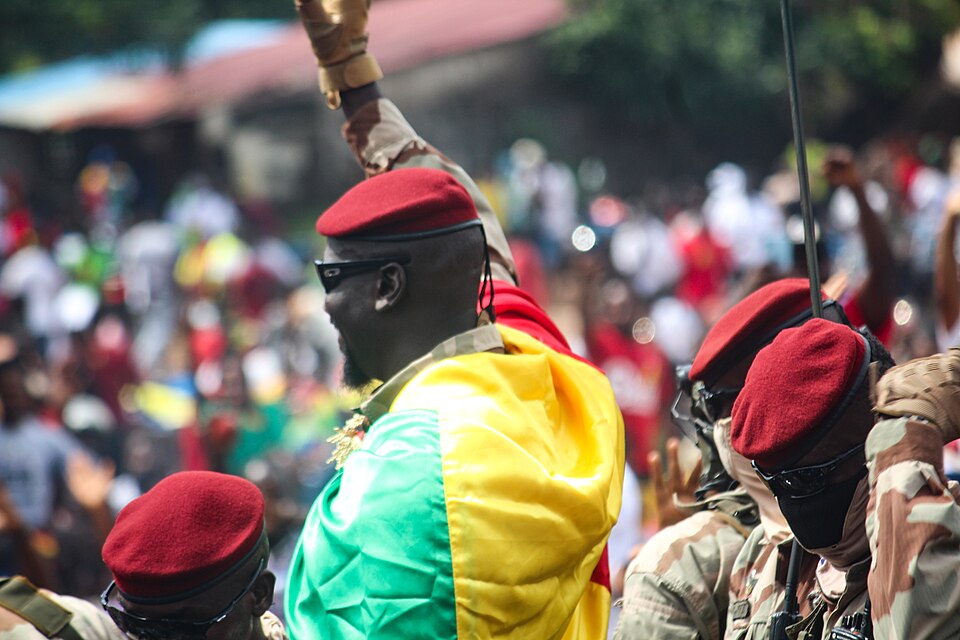
More on this story: Guinea Votes on a Controversial New Constitution — What’s at Stake
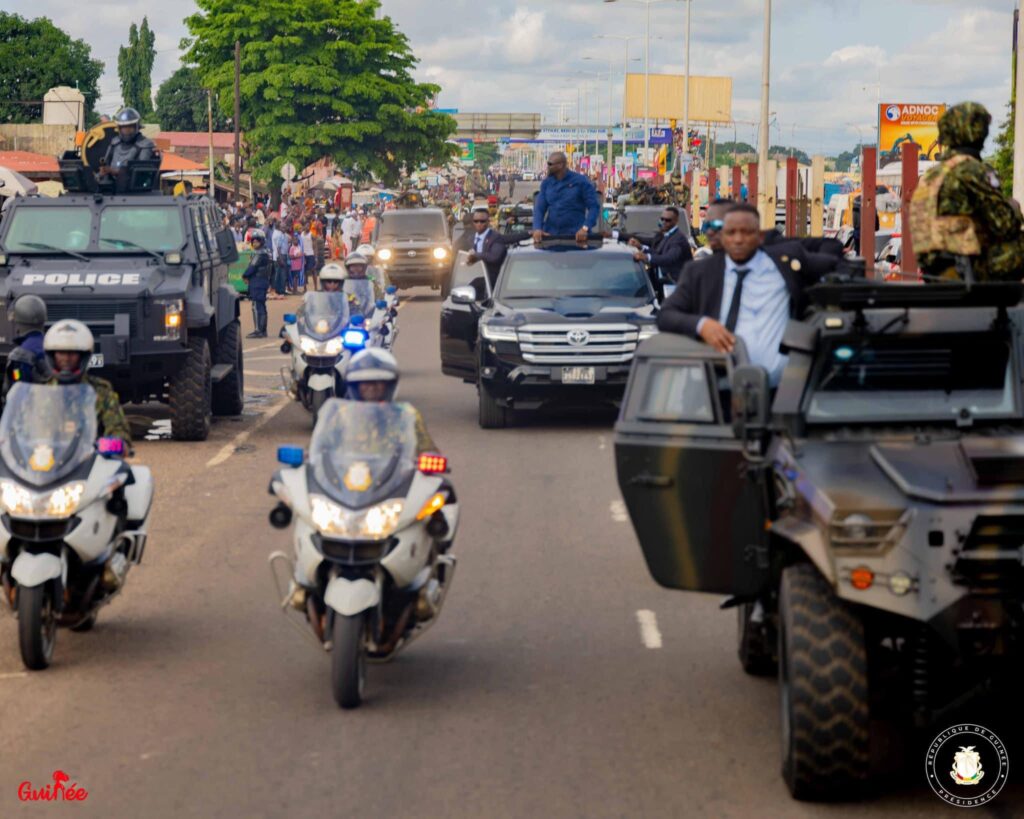
Posted inCorruption Democracy Governance
More on this story: Guinea’s September 21, 2025 Constitutional Referendum: Aims, Issues, Outcomes, and Stakeholders
Narrative Explanation of Risks
Opposition-led unrest and crackdown: Guinea’s transitional junta leader, Gen. Mamady Doumbouya, has surprised many by entering the Dec. 28, 2025, presidential race (after previously promising not to run). Civil society and opposition forces (the Forces Vives coalition) have condemned this move as a “perjury” and a bid to seize power . Under Doumbouya, the government has already suspended or dissolved dozens of parties, banned protests, and harshly repressed critics . For example, the junta recently suspended the parties of former leaders Alpha Condé and Cellou Dalein Diallo ahead of the constitutional referendum . In late 2025, civil society called for mass mobilization (“thwart by all means” Doumbouya’s candidacy) . Such exclusion of major candidates and the prospect of a disputed vote make large-scale demonstrations very likely. If protests erupt, security forces have a history of firing on crowds . The consequences would be severe: political legitimacy would collapse, violent street clashes could follow, and Guinea’s fragile stability would be further eroded. Already, foreign governments like the US have warned that Guinea must hold “transparent and inclusive” elections . A flawed election could provoke international sanctions (ECOWAS and others have warned of consequences for any military power-play ).
Ethnic Mobilization and Violence: Guinea’s politics are deeply shaped by ethnicity. The largest groups – the Malinke (roughly 35% of population, historically backing leaders like Condé) and the Fulani/Peul (about 40%, core of Diallo’s UFDG) – have clashed repeatedly in past elections . If the election is perceived to favor one group (for example, banning UFDG’s Diallo, who is Fulani, might be seen as ethnic targeting), communities could mobilize along these lines. In past years, Fulani and Malinke youths fought street battles in Conakry neighborhood . Renewed ethnic riots could break out in cities or mining towns, especially if law enforcement is seen as partial. Such violence would not only cause loss of life but could threaten entire districts. It would spill over into security (armed community militias confronting forces), disrupt local markets and roads (civil unrest), and jeopardize stability. Mining regions (e.g. in Kankan, Mali region; Labé, Fouta Djallon) could be flashpoints if ethnic groups control mining labor. Though ethnic unrest alone might not trigger broad diplomatic fallout, it would compound Guinea’s internal instability and discourage investment or aid, feeding back into national political breakdown.
Mining Sector Disruptions: Guinea’s economy depends heavily on mining, so unrest in that sector has outsized impact. Recently, tensions in mining regions have already boiled over: on October 4, 2025, local protesters at the Weily Mining gold site in Siguiri rioted over grievances (demanding the release of detained community members)reuters.com. They torched vehicles and buildings, killing two people. Guinean prosecutors charged dozens with arson and murder . Reuters notes “rising unrest at mining sites amid a regulatory crackdown” in Guineareuters.com. At the world-famous Simandou iron project, safety failures have killed workers (13 locals died since 2023) and even halted operations when three foreign contractors died in Oct. 2025. Any election-period flare-up – such as further community protests, worker strikes, or sabotage – could shut down shipments or delay production. This would spark immediate economic pain (lost revenues) and panic investors. Security forces may be stretched by election duties and protests, making mine security harder. In the worst case, key infrastructure (railways to ports, haul roads) could be targeted by saboteurs or criminal groups under cover of chaos, further disrupting logistics.
Regional and Diplomatic Fallout: Guinea’s election will not unfold in isolation. ECOWAS has strict rules on coups and democratic transitions: it condemned the 2021 coup and sanctioned Guinea’s junta until a credible return to civilian rulerefworld.org. Although sanctions were lifted in 2024 after initial reforms, any move seen as clinging to power (e.g. Doumbouya’s candidacy, jailing opponents) could re-trigger regional sanctions or suspension. Indeed, civil society has pointed out that African charters bar coup plotters from elections . International observers (the EU, UN, AU) will scrutinize the vote. The US and EU have already voiced alarm over delays in the transitioneuronews.com. A transparent, inclusive process could secure Western support; but if Guinea appears to rig the election, foreign aid and military cooperation may be frozen. This diplomatic fallout would deepen the crisis: Guinea could become isolated like Mali/Niger, pushing it into a niche alliance (e.g. closer to Rwanda or China) and straining relations with traditional partners (France, EU). Investment in mining or infrastructure might also be stalled by legal uncertainty. In short, a flawed election risks turning Guinea into a pariah state in the region, amplifying the political and economic dangers.
Security Threat from Sahel Spillover: Though Guinea’s coup has so far been internal, its long unguarded border with Mali and Guinea-Bissau poses a regional security risk. Islamist insurgents in Mali launched ~1,500 attacks in 2024, and in Feb. 2024 militants even crossed into Guinea’s Kouroussa region. During the election period, security forces will be focused on cities and protests, potentially leaving rural border areas more vulnerable. A conflict in Mali or Burkina could spill over (e.g. jihadists or ethnic militias seeking new territories). This is a medium-likelihood risk, but the impact could be high: any insurgent incursion could destabilize eastern Guinea, disrupt mining developments (especially Simandou’s rail route through the border), and force army redeployments. A sudden security crisis would complicate the election timetable and potentially provoke a harsh military clampdown nationwide. While not a direct electoral trigger, regional insecurity is a cascading risk that could aggravate political turmoil and undermine public trust in the transition.
Summary of Consequences: Each of the risks above intersects. A contested election and resulting protests (Opposition Unrest) would almost certainly produce civil unrest and violent security responses (affecting Political Stability). Escalating ethnic tensions would amplify local conflicts (harming Security and Stability). Mining sector disruptions directly hit the economy (Mining/Logistics) and could be both a trigger and effect of unrest. Regional/diplomatic backlash could cut Guinea off from aid and investment (Diplomatic Fallout), pressuring the fragile political order. And any spillover violence from the Sahel (Security threat) would strain the government and possibly trigger emergency measures nationwide.
Collectively, these risks paint a volatile picture for the Nov 2025–Jan 2026 election period. The most credible immediate threats—mass protests and government crackdowns—are already unfolding in real time. Guinea’s leadership and international partners will need to monitor these risks closely to prevent a return to widespread instability.


